The Miracle Woman Blu-ray Movie
HomeThe Miracle Woman Blu-ray Movie 
Sony Pictures | 1931 | 90 min | Not rated | No Release Date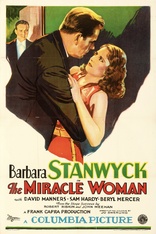
Price
Movie rating
6.8 | / 10 |
Blu-ray rating
| Users | 0.0 | |
| Reviewer | 3.0 | |
| Overall | 3.0 |
Overview
The Miracle Woman (1931)
Sister Fallon, a young woman with a gift for religious oratory, gains fame through the efforts of an unsavory promoter who stages phony "faith healings" during her services. At first seduced by the money, she soon grows weary of the deception and tries to escape the racket, a situation that becomes a genuine trial by fire. Loosely inspired by the famous California evangelist Aimee Semple McPherson and Sinclair Lewis's novel ELMER GANTRY, THE MIRACLE WOMAN was one of Capra's few box office failures for Columbia Pictures, but it remains a fascinating expose of religious charlatans and phony faith healers.
Starring: Barbara Stanwyck, David Manners, Sam Hardy (I), Russell Hopton, Charles Middleton (I)Director: Frank Capra
| Drama | Uncertain |
| Romance | Uncertain |
Specifications
Video
Video codec: MPEG-4 AVC
Video resolution: 1080p
Aspect ratio: 1.33:1
Original aspect ratio: 1.2:1
Audio
English: DTS-HD Master Audio Mono
Subtitles
English, English SDH, French
Discs
Blu-ray Disc
Single disc (1 BD)
Playback
Region A (B, C untested)
Review
Rating summary
| Movie | 4.0 | |
| Video | 4.0 | |
| Audio | 3.0 | |
| Extras | 1.5 | |
| Overall | 3.0 |
The Miracle Woman Blu-ray Movie Review
Reviewed by Kenneth Brown December 20, 2024Making its high-definition debut in the Frank Capra at Columbia Collection, The Miracle Woman tells the story of a phony faith healer who fights the temptation to go straight when she falls for a blind man. The Blu-ray features a solid AV presentation (particularly for a film of its age), along with a newly filmed Ron Howard featurette.
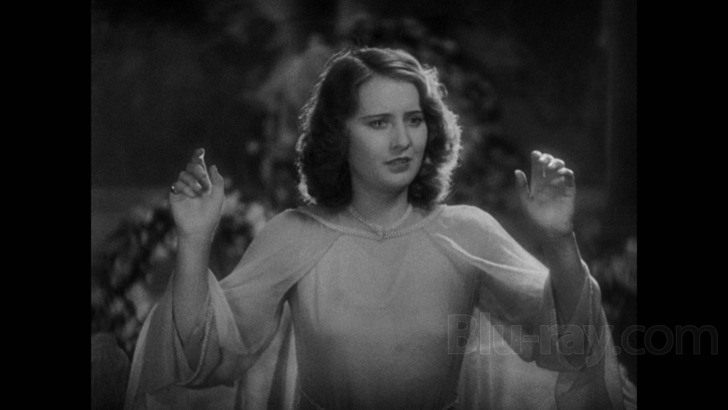
Directed by Capra in 1931 pre-Code Hollywood, The Miracle Woman is based on the play "Bless You Sister" by John Meehan and Robert Riskin. It stars Barbara Stanwyck as Florence Fallon, the crafty daughter of an elderly pastor who dies of a broken heart when he's replaced by a younger minister by their church. She shames the people during a fiery sermon but soon departs the path of the angels when a slickster named Hornsby (Sam Hardy) convinces her to use her skills to become "Sister Fallon," of the "Temple of Happiness." Performing staged miracles to the shock and delight of the masses, she meets John Carson (David Manners), a blind man who survives suicide and recovers, thanks in large part, to one of Florence's radio sermons. Though initially skeptical, Carson finds himself falling for the so-called miracle woman -- with the help of a (truly horrifying *shudder*) ventriloquist dummy named Al, with whom John has honed a new talent -- and growing closer to her, even after she admits the ruse, as he comes to know the heart within the huckster. But when Hornsby and Florence's reputations are threatened and Hornsby forces a kiss on an uninterested Florence, the world starts to tip and turn for poor Fallon. As Hornsby's crimes mount, Florence has to decide if she is going to continue her fraudulent act or return to her faith.
Dummy aside (*shiver*), Stanwyck and Manners boast real chemistry. Their on-screen pairing is full of warmth and pathos, and Stanwyck proves herself an accomplished actress as Florence wrestles with her grief and anger. The morality tale at the center of the story is ever-present but largely sidelined in exchange for a study of people torn between opportunism and contentment, and ultimately the driving conflict is one of money vs. principle, which Capra would later perfect in Mr. Smith Goes to Washington and It's a Wonderful Life. Biographer Vito Zaggiro famously referred to the filmmaker as "the great constructor of happy endings," a title not far from the mark. But Capra is less concerned with Florence and John finding true happiness than he is with seeing them develop as moral beings struggling to rise above the lesser halves of themselves. Her schemes and his suicidal impulses are merely the opening foray into a duo fighting to survive a world that demands each one to offer up tangible value, when it's their inherent value that proves the most formidable and remarkable. John no more needs his sight than Florence needs her miracles, but it takes them tremendous trials and tribulations to realize as much. I would disagree with Zaggiro a bit. Capra isn't the great constructor of happy endings; he's the great constructor of tests of moral character and fortitude; a man who rewards the pure of spirit and chastises the corrupt and unremorseful.
If there's any shortcoming to The Miracle Woman, it's that its players are a touch one-note. Not exactly surprising for the era, but still too simplistic by today's standards, Florence will, of course, choose the right path. Eventually. John will certainly love her in spite of what she was when he met her, and will naturally encounter the promise of restored sight. (Thankfully not by Florence's hand.) And wouldn't ya know it? Hornsby is everything from a crook to a cad to a corruptible influence, with little in the way of redemption on his horizon. It's a quaint story, extended to its limits, and sweet as it can be, it doesn't hold up to today's keener eye for character arcs and moral complexity. But it also wears its heart on its sleeve with such abandon that it's hard to fault it or anyone involved for its more saccharine qualities. Capra lays the groundwork for later, better films in his career, but The Miracle Woman is as much responsible for It's a Wonderful Life as any other film in his canon. Watching it now, especially with his future films in mind, is fascinating; it's a crucial step in his evolution as a filmmaker and one that clearly showcases the talent blossoming within the artist.
The Miracle Woman Blu-ray Movie, Video Quality 
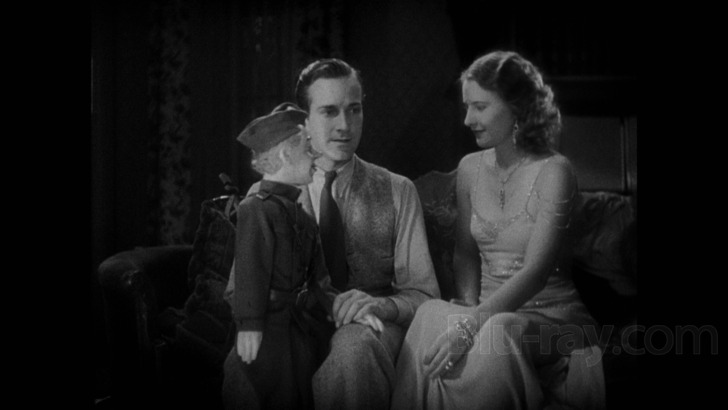
Like several other Blu-ray debuts of early films included in the Frank Capra at Columbia Collection, The Miracle Woman's 1080p/AVC-encoded video transfer only suffers from a single issue: print wear in the form of faint vertical white lines that appear from time to time. Otherwise, all is well. Capra's black and white morality tale features oh so satisfying black levels and excellent contrast leveling. Midtones are lovely, and rarely, if ever, disrupted by the picture's unintrusive grainfield, which is refined and nicely resolved. Detail is very good as well, despite the fact that the film is much softer than modern viewers are used to. It won't earn raves but, for those familiar with productions of the era, it proves more than pleasing; its faithfulness to the original photography one of its best qualities. Other than the print wear, there isn't any blocking or banding. The encode is quite attractive actually, with plenty of room to breathe on a single disc (compared to a few others in the Frank Capra at Columbia Collection, which share a disc with a second film). All in all, I have very few complaints. Kudos, Sony, even for the lesser presentations in the box set.
The Miracle Woman Blu-ray Movie, Audio Quality 
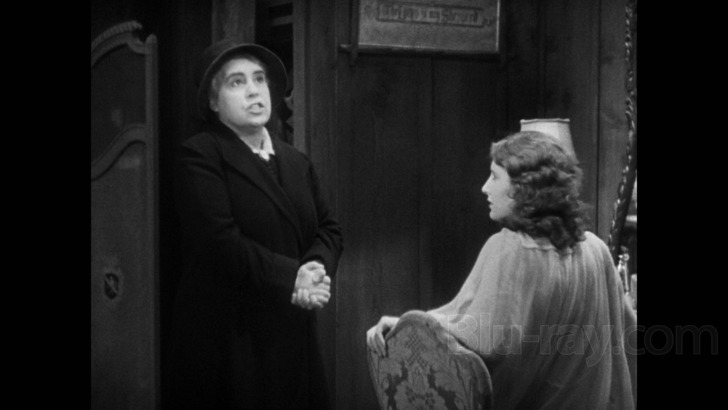
The Miracle Woman's DTS-HD Master Audio mono mix doesn't disappoint, but it doesn't exactly impress either. Dialogue is clear and intelligible, prioritization is decent, and only a minimal amount of hiss and hollow/boxy effects and music threaten the proceedings. For a product of its time, though, the mix delivers the necessary results and manages to emerge as more than adequate to the task at hand.
The Miracle Woman Blu-ray Movie, Special Features and Extras 
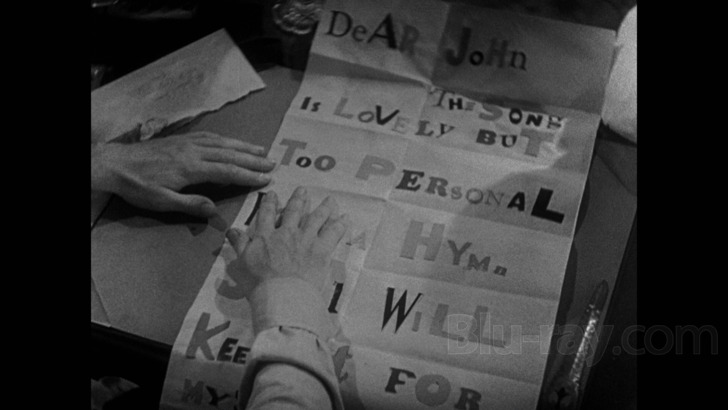
The Blu-ray debut of The Miracle Woman includes a single extra: a 7-minute HD featurette in which filmmaker Ron Howard discusses the early Capra film and its legacy.
The Miracle Woman Blu-ray Movie, Overall Score and Recommendation 
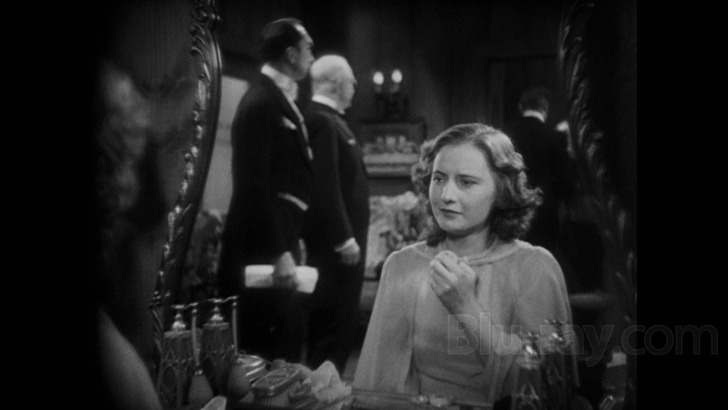
The Miracle Woman took me by surprise. I enjoyed it far more than I expected to and found its ties to later Capra films and themes to be an intriguing aspect of the production. It isn't going to supplant It's a Wonderful Life or Mr. Smith Goes to Washington on anyone's list, but as an early work in the filmmaker's canon, it stands tall. Sony's video presentation only helps, even if the disc's audio mix is fairly average and its supplemental package is nearly barren.
Similar titles
Similar titles you might also like
(Still not reliable for this title)

Ladies of Leisure
1930

Forbidden
1932

The Bitter Tea of General Yen
1933

Rain or Shine
1930

The Way of the Strong
1928

The Younger Generation 4K
SDR
1929

That Certain Thing
1928

Submarine 4K
SDR
1928

American Madness
1932

Platinum Blonde 4K
1931

So This Is Love?
1928

Lady for a Day
1933

Flight
1929

Dirigible 4K
SDR
1931

The Vanishing of Sidney Hall
2017

Lost Horizon
1937

Kept Husbands
1931

The Carpetbaggers
1964

The Lady Refuses
1931

The Woman Between
1931